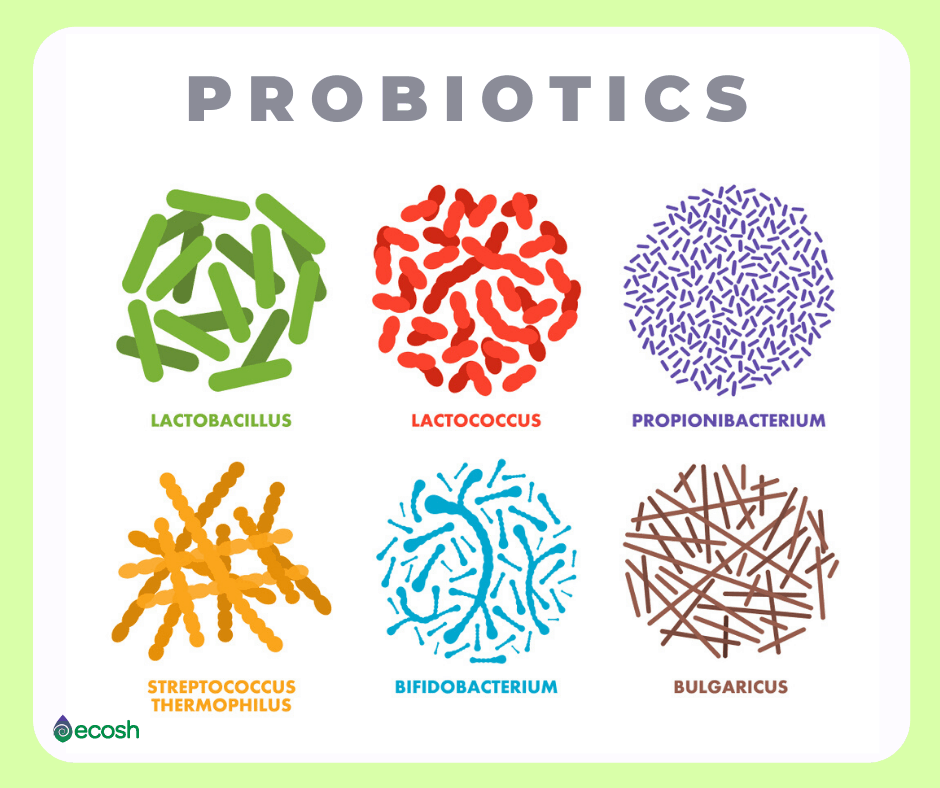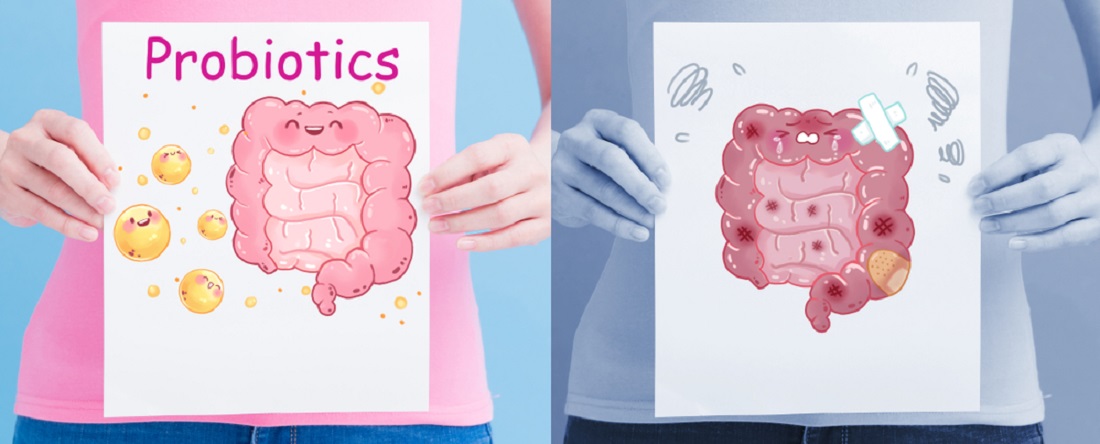IMBALANCE OF GUT MICROBIOTA (GUT DYSBIOSIS) - SYMPTOMS, CAUSES, COMPLICATIONS AND NATURAL TREATMENT
Dysbiosis (also called dysbacteriosis) is a microbial imbalance inside or on the body like damaged microbiota. Much of our well-being and immune system depends on the ratio of good to bad bacteria throughout our body, but especially in the digestive tract.
The digestive tract is like our overall health and well-being control center which influences everything that happens elsewhere in the body.
Studies have shown that the intestinal microbiota affects not only our physical body but also our brain function, moods, feelings, and fears.
Therefore, it is extremely important to maintain a balance between good bacteria, ie probiotics, and bad bacteria. However, it seems that nowadays it is almost impossible to keep the body's microbiota in balance. Why is that so, what are the symptoms, causes, and consequences of dysbiosis, and how to treat this imbalance of microbiota naturally?
Where Bacteria Lives In Your Body?
The quick answer to this is that everywhere, but still, the concentration of bacteria is highest in the mouth, skin, and gastrointestinal tract. It is thought that ¾ our immune system depends on what happens in our digestive tract and intestines.
In addition to keeping us healthy, it is believed that bacteria in the digestive tract affect also our hormone levels, metabolism, and mood.
We, as humans, have contact with bacteria for the first time in our lives at the time of birth, where - on the way out, we get the mother's good bacteria and protective microbiota.
Thus, children born naturally have a stronger immune system and are protected against, for example, eczema and many other diseases.
Bacteria In Your Mouth
Bacteria in the mouth are largely the result of what we eat and what we leave on our teeth after eating. The predominance of bad bacteria in the mouth can cause gingivitis, plaque buildup on the teeth, and other mime diseases.
So in itself, what you eat also affects the condition of your teeth, not just the number and duration of brushing.
The most common bad bacteria in the mouth are Streptococcus mutans, Porphyromonas gingivalis, and Tannerella forsythia. The good ones are S. sanguinis, Actinomyces naeslundii, and Veillonella dispar.

Bacteria On Your Skin
The skin is the largest human organ that protects our body from external invaders. Approximately 1,000 different types of bacteria have been found in human skin and body hair. However, most of them are harmless to us or beneficial to both parties. Good bacteria on the skin, such as Staphylococcus epidermidis, protect the skin surface from bacterial infections that can be caused by bad bacteria living outside the body.
In other words, they are constantly working to prevent pathogenic bacteria from colonizing our skin, releasing chemicals that are harmful to the skin, fighting for resources on the skin, or affecting the skin's immune system.
In return for allowing good bacteria to nest on our skin, they protect us from dermatitis, acne, rosacea, and other skin diseases.
Bacteria In Your Gastrointestinal Tract
The human gut is home to a large number of different microorganisms that enjoy its ideal temperature, acidity, and food supply. The benefits of bacteria are insanely great and important to us. Without them, our body would not be able to cope with many tasks.
Some of the more important good bacteria are Lactobacilli, Bifidobacterium, and Caulobacter. The best known pathogenic bacteria are Salmonella, Vibrio Cholerae, and Shigella.
Food poisoning is an example of where bad bacteria have prevailed, but if you have enough good bacteria in your stomach, you should recover quickly.
Good bacteria (Probiotics) and digestive enzymes are also available to purchase online.
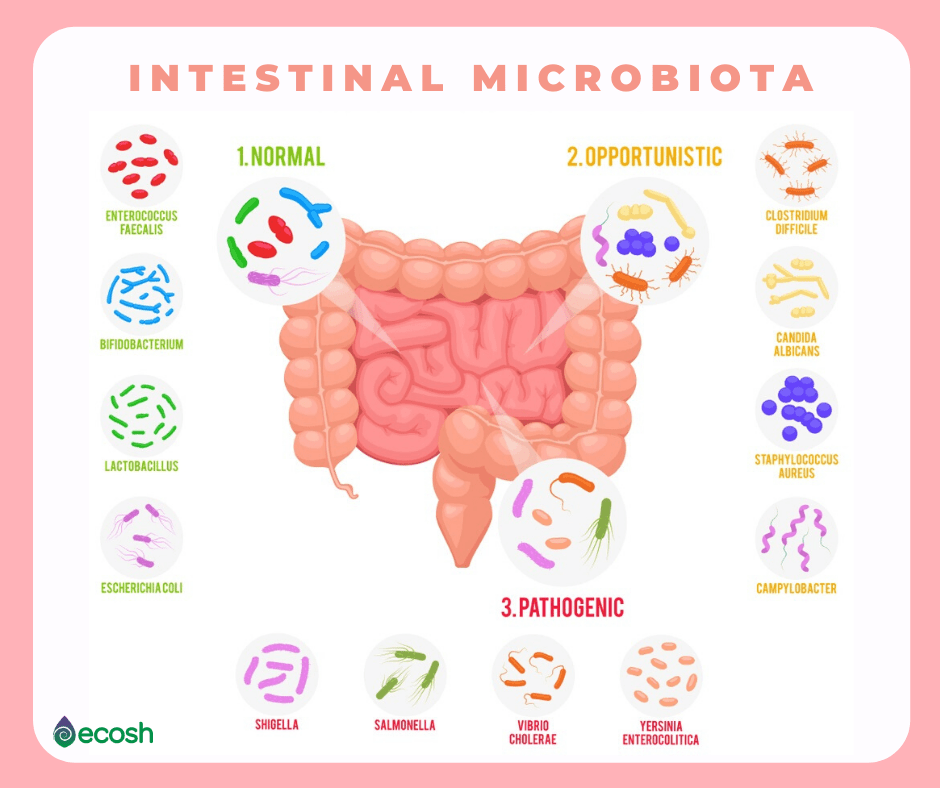
Function Of Bacteria In The Gut
- Digestion of food - The microflora breaks down proteins, carbohydrates, and fats. Saprophytic bacteria form various enzymes that increase the activity of the digestive tract. Acids and gases produced by bacteria promote normal intestinal function and the production of feces, thus releasing residues from the body.
- Synthesis and development of certain useful and important substances (vitamins, hormones (more than 20 different), enzymes, elements of the immune system, etc.) - Vitamins can only be produced in the body by healthy microflora. The main workers there are bifidobacteria, bacteroides, lactic acid bacteria, and E. coli. The E. coli can form many vitamins, such as B1, B2, B6, PP, B12, and K. Bacteria in the cecum synthesize the most vitamin B12 and contribute to the absorption of the same vitamin found in meat foods. The microflora also creates conditions for the absorption of fat-soluble vitamins such as A, E, and D. This is especially important in children, as children develop a vitamin deficiency if the microflora is out of balance.
- Water uptake
- Protecting the body and repelling dangerous bacteria - E. coli (mainly) form bactericidal and bacteriostatic (bacterial proliferation inhibiting) substances, which are similar in properties to antibiotics. In this way, they prevent the multiplication of serious infectious diseases.
- Neutralization of toxins and harmful substances
- Maintaining normal cholesterol levels
- Sustaining normal intestinal gas levels
- Maintaining a stable metabolic and hormonal balance
- Preventing the formation of stones in the organs and even the development of cancer
- Developing immunity - In addition, the intestinal microflora participates in the formation of immunity by promoting the synthesis of protective bodies - immunoglobulin.
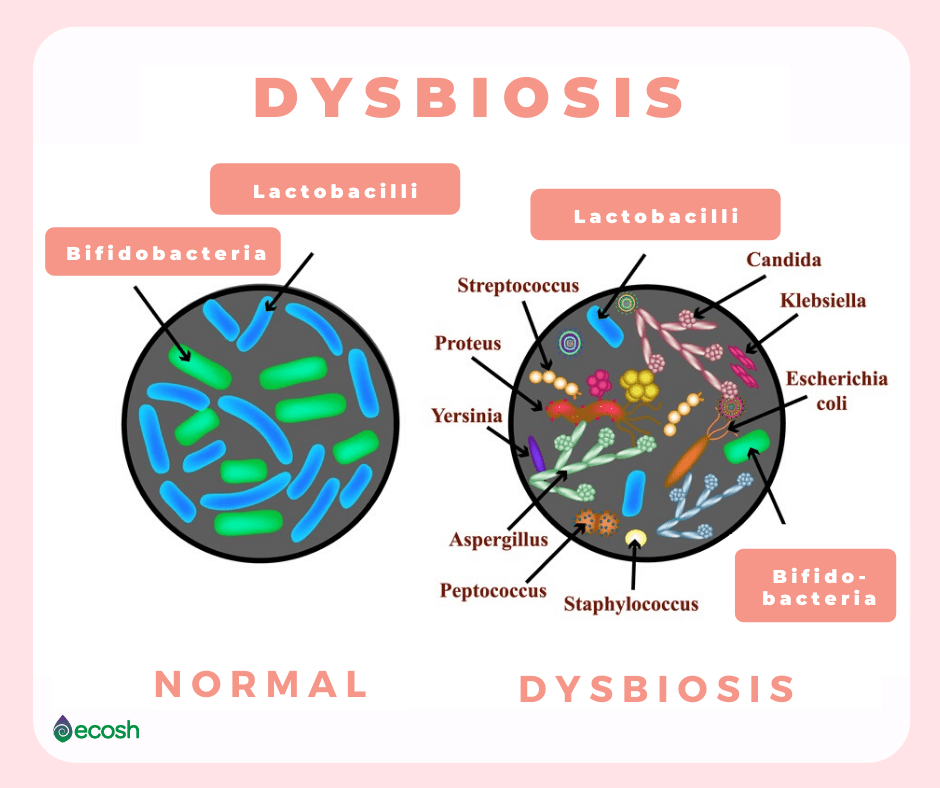
Why Is Destroying Good Bacteria A Problem?
As we know, our body develops defenses and antibodies according to the bacteria it is exposed to in the first years.
Studies have shown that children who play with mud and sometimes put sand or soil in their mouths and are exposed to many other bacteria in other ways - develop a stronger immune system as they get older.
However, our society has become a very sterile society in many ways, and the excessive worship of purity in the modern world takes the opportunity to cultivate a bacterial experience in their bodies and also disrupts the microbiota of many adults.
Of course, maintaining cleanliness is necessary, but the current situation has already become completely ridiculous. In fact, in the great aftermath of killing bacteria, it has become increasingly impossible to maintain a diverse and balanced digestive tract and skin ecosystem.
As a result, it weakens our immune system, making us increasingly ill and pathogenic bacteria stronger. In conclusion, diseases are becoming more difficult to treat and this does not mean anything good in the long run.
Therefore, we need to start consuming more good bacteria - probiotics.
Good bacteria (Probiotics) and digestive enzymes are also available to purchase online.

Dysbiosis Causes - What Kills Good Gut Bacteria?
External Causes of Dysbiosis
- Disinfectants - Our entire living environment has become increasingly antibacterial and chemical. It is very common not to only wash hands daily, but also use disinfectants (of course this is necessary for medical institutions). However, the disinfectant kills all bacteria, also the good ones that protect our skin.
- Household chemicals - To clean our homes, we use more and more strongly smelling and concentrated household chemicals that often destroy 99.9% of bacteria.
- Laundry - Nowadays, we use not only washing powder but in addition stain remover and fabric softener. The stronger and better the smell, or the more chemical they are, the more popular they will be for many. It is very lovely for a fabric softener to rinse out the washing powder and make the laundry soft, but if it stays in the laundry instead of the washing powder, should you suddenly think of another product that will wash off the fabric softener?
- Toilet pot - It is not enough to clean the toilet pot with a cleaning agent (or one that only loses visible dirt), it must be inside a toilet pot that destroys the germs with each rinse and keeps the pot clean and fragrant.
- Mouthwash - In addition, just brushing your teeth is not good enough nowadays. Therefore, to make sure that all the bacteria in the mouth have died, it is necessary to use a mouthwash after washing.
- Pollution

Internal Causes Of Dysbiosis
Everything with what we lubricate ourselves and eat - starting at an early age is a separate issue. The more processed and sugary foods we eat, the more we live in a stressful environment, the more we are physically overworked, the more bad bacteria take over our bodies and our health deteriorates. This is why we are susceptible to all kinds of viruses and infections.
- Drinking too much alcohol (two or more alcoholic beverages per day)
- Eating too much protein, sugar, or consuming a high amount of food additives
- High-fat and high sugar diets, and diets that are low in fermentable fiber also lead to dysbiosis (Trusted Source)
- Accidental consumption of chemicals, such as lingering pesticides on unwashed fruit
- Poor dental hygiene, which allows bad bacteria to grow out of balance in your mouth
- High levels of anxiety or stress, which can weaken your immune system
- Cancer and chemotherapy
- The use of antiviral drugs and radioactive isotopes
- Hormone therapy
- Chronic and acute infections (HIV, Hepatitis C, and B)
- Diabetes mellitus
- Diseases of liver and pancreas
- New medications, especially antibiotics, that affect your gut flora
- Unprotected sex, which can also expose you to harmful bacteria
- Presence of intestinal parasites (helminths)
- Uncontrolled rectal cleansing with enemas
- Inflammatory processes in the intestines
- Dysbiosis on your skin can be caused by exposure to harmful bacteria or an overgrowth of a single type of bacteria. For example, Staphylococcus aureus bacteria can grow out of control and lead to a staph infection. Gardnerella vaginalis bacteria can overtake healthy bacteria in the vagina and cause vaginal burning, itching, and discharge.
Dysbiosis Complications - Microbial Imbalance
If the proportion of pathogenic microbiota or bad bacteria increases up to 25%, then in this case the proportion of good bacteria has already decreased too much and the existing ones can no longer perform their tasks.
The characteristics of dysbiosis (imbalance of microbiota) can manifest in several different ways.
However, dysbiosis is usually mild and can be treated through medication and lifestyle changes. But if left untreated, dysbiosis can lead to chronic conditions and serious diseases.
So, see your doctor right away if you’re experiencing any unusual or persistent stomach pain or skin irritation.
Good bacteria (Probiotics) and digestive enzymes are also available to purchase online.
Dysbiosis is a risk factor for certain diseases and conditions, including:
- Allergies
- Anemia
- Cancer in your colon or rectum
- Celiac disease
- Damage in the function of organs
- Depression
- Diabetes
- Gastrointestinal (GI) disorders, including gastritis, peptic ulcer disease
- Gut diseases, such as colitis
- Gynecological problems and Candida, a type of yeast infection
- Heart disease or heart failure
- Herpes
- IBS
- Inflammation
- Irritability
- Late-onset dementia
- Leaky gut syndrome
- Liver and kidney disease
- Mental disorders
- Obesity
- Parkinson’s disease
- Polycystic ovary syndrome
- Skin conditions, such as eczema
- The amount of waste generated by bacteria begins to poison the body and the ability to fight infections decreases
- The deficiency of nutrients
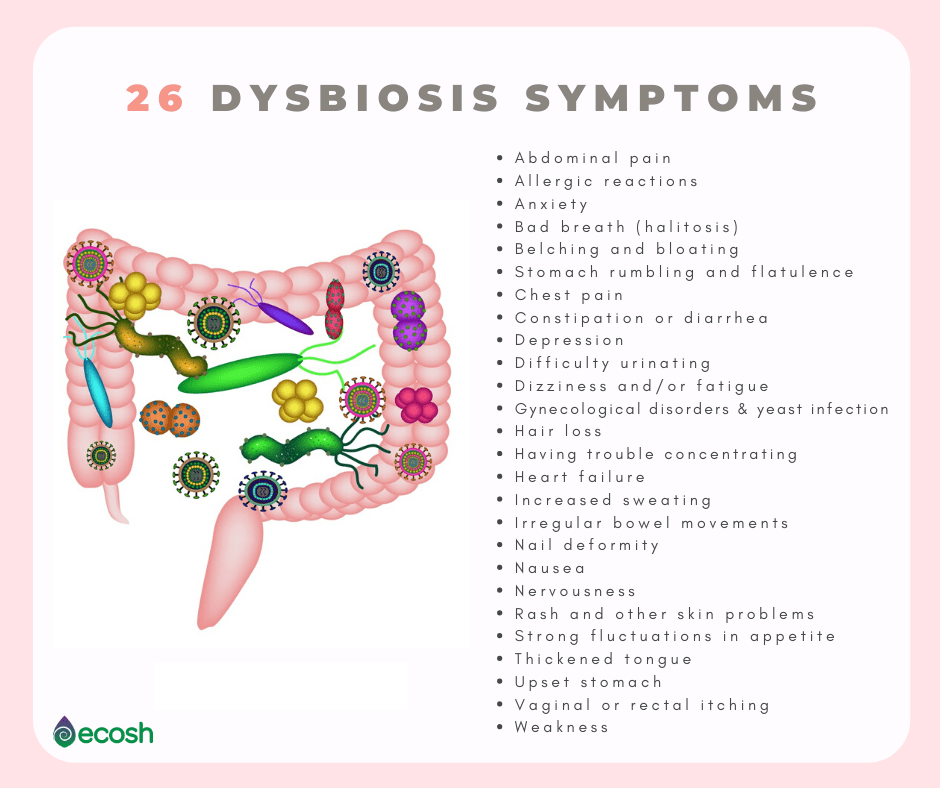
Dysbiosis Symptoms
- Abdominal pain
- Allergic reactions
- Anxiety
- Bad breath (halitosis), unpleasant taste in the mouth on an empty stomach
- Belching and bloating
- Stomach rumbling and flatulence
- Chest pain
- Constipation
- Depression
- Diarrhea
- Difficulty urinating
- Dizziness
- Fatigue
- Gynecological disorders and yeast infection in women
- Hair loss
- Having trouble thinking or concentrating
- Heart failure
- Increased sweating
- Irregular bowel movements
- Nail deformity
- Nausea
- Nervousness
- Rash and other skin problems such as dry lips, cracks and sores in the corners of the mouth (lack of B vitamins), redness, scaling of the skin and pyoderma (rash), graying of the face
- Strong fluctuations in appetite
- Thickened tongue
- Upset stomach
- Vaginal or rectal itching
- Weakness
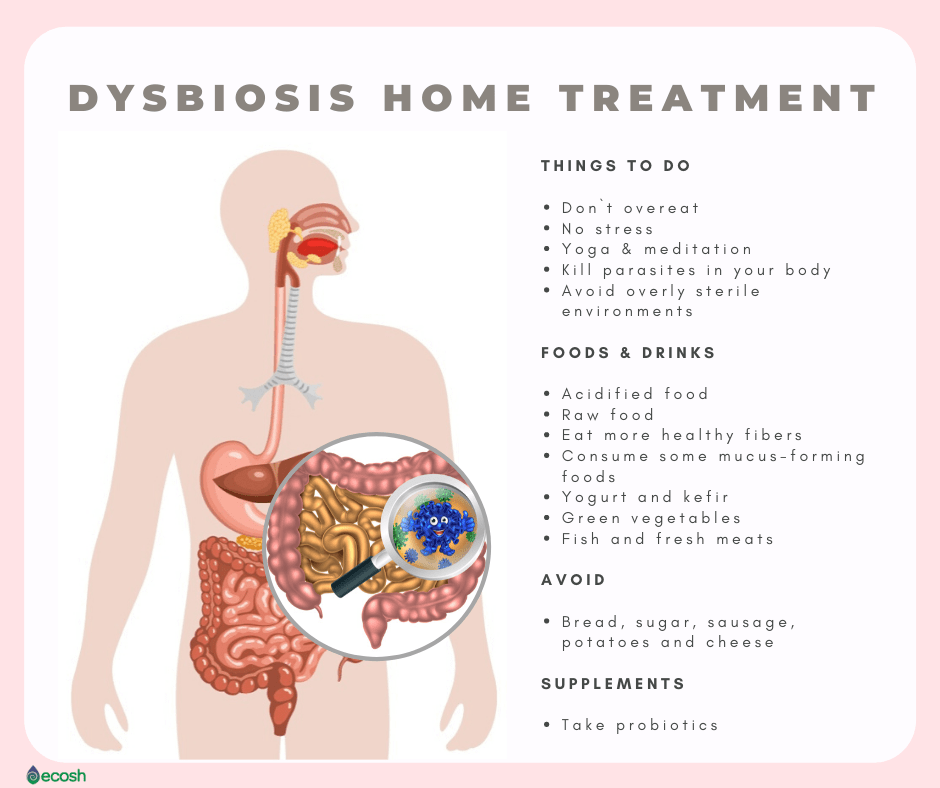
Dysbiosis Natural Treatment
Things You Can Do
- Don't overeat. Especially in the evening - the reduced amount of enzymes cannot process all the food and the food residues start to promote the development of pathogenic bacteria.
- Improve working conditions and fight stress, as dysbiosis can become chronic when stress intensifies and depression develops.
- Clean the gastrointestinal tract and, if necessary, kill parasites in the body. There are dietary supplements available, like black walnut extract to help you to clean the intestines and get rid of the parasites naturally.
- Some research shows that meditation and yoga can help your body better absorb nutrients. It can also increase blood flow to your brain and back to your gut. This can reduce some of the symptoms of dysbiosis.
- If possible, avoid overly sterile environments and reduce the use of products that kill all bacteria. This way, your body will never learn to take action against bad bacteria.

Foods You Can Eat
- Consume more raw and acidified food that has not been cooked. They contain a lot of phytoncides, antibiotics, and enzymes. Enzymes play a particularly important role. They help the weakened body to break down and process food. For example, eat sauerkraut, sour apples, and/or drink apple juice with honey. After all, this is necessary to normalize the acidity of the gastrointestinal tract, as the acidic environment prevents the development of pathogenic microflora.
- Consume more food that is high in good fiber like fermentable fiber, particularly prebiotic fiber, as fiber is necessary for the growth of good bacteria. For example, germinated grains, nuts, beans, legumes, fats (preferably linseed oil).
- Use sour milk, yogurt, and kefir as sources of beneficial bacteria.
- Include foods that promote the development and multiplication of good bacteria such as yeast extract, whey, seaweed, carrot juice (up to 1 glass per day), fresh cabbage, beets, raspberries, cranberries, apricots, pomegranate, grapefruit, chokeberry, onion, apple, parsley, celery, garlic, turmeric, etc.
- It would be good if you also ate food that contained some mucus-forming substances. It helps to remove toxic substances from the body during destruction. Such as marsh mallow (Althaea officinalis), Icelandic lichen, calluna (Calluna vulgaris), malva, flax, sweet clover (Melilotus L), coltsfoot (Tussilago farfara), plantago, saponar, teia (Saponaria officinalis), mullein (Verbascum), great mullein (Verbascum thapsus).
- Foods that you can add to your diet include also dark, leafy greens (including spinach and kale), fish (including salmon and mackerel), and fresh meats (avoid processed meat products).
Foods You Should Avoid
- In acute cases (bloating, abdominal pain, diarrhea) do not eat foods that cause the formation of bad microorganisms - bread, sugar, sausage, potatoes, and cheese. After all, these foods are a treat for bad bacteria and cause them to multiply rapidly.
- Foods that contain harmful chemicals
- Dairy products like milk and cheese
- Processed meats, such as salted or canned meat and deli meat
- Carbohydrates in corn and oats
- Foods high in sugar (corn syrup, maple syrup, and raw cane sugar)
Dietary Supplements To Restore The Balance Of Your Microbiota
Probiotics - If your microbiota is more extensively damaged, provide the body with live probiotics that help keep your gut bacteria in balance. Probiotics and digestive enzymes are also available to purchase online.
Fibers - Healthy fibers will naturally help to cleanse your intestines from toxins and also enrich your body with the necessary nutrients.
Black Walnut Extract - In case you need to get rid of the intestinal parasites.
Nutrients - In conclusion, also make sure you’re getting enough nutrients to keep bacteria in balance, including:
Ultimately, if you want to strengthen the mental and physical health of your entire body, start with your stomach - by promoting good bacteria. It's not only about killing the bad ones. This eternal fight for balance between good and bad bacteria is infinite, but it is worth it for the sake of your mental and physical health.
NB! The information provided here is for informational purposes only, so do not consider it as health care or medical diagnosis and treatment. Do not consider this information as a guarantee of the results you want to achieve. In addition, this information is not intended to replace the advice of your physician or other healthcare professional.
Even more, you should not use it to diagnose or treat a health problem. Before changing or discontinuing your existing medication, treatment, or care, or taking any dietary supplements, be sure to consult with your healthcare professional or doctor before starting any diet or program, or if you suspect you may have a medical condition.
Written by Maria-Helena Loik
This article was first published on Ecosh.com
Pictures: Pexels.com, Pixabay.com, Shutterstock.com
Sources:

